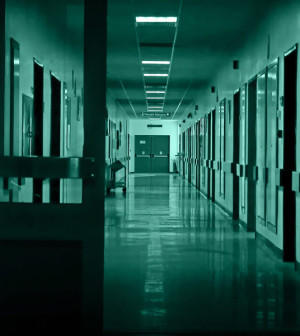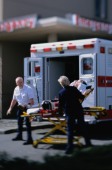- Could Your Grocery Store Meat Be Causing Recurring UTIs?
- Are You Making This Expensive Thermostat Error This Winter?
- Recognizing the Signs of Hypothyroidism
- 10 Strategies to Overcome Insomnia
- Could Artificial Sweeteners Be Aging the Brain Faster?
- Techniques for Soothing Your Nervous System
- Does the Water in Your House Smell Funny? Here’s Why
- Can a Daily Dose of Apple Cider Vinegar Actually Aid Weight Loss?
- 6 Health Beverages That Can Actually Spike Your Blood Sugar
- Treatment Options for Social Anxiety Disorder
Fear of Police Keeps Many Hispanics From Calling 911, Study Says


Distrust of police prevents many Hispanic Americans from calling 911 when someone is suffering cardiac arrest, a new study reveals.
“Residents of low-income, minority neighborhoods have two strikes against them: The incidence of out-of-hospital cardiac arrest is much higher than average and rates of bystander CPR are below average,” said study lead author Dr. Comilla Sasson, of the University of Colorado School of Medicine.
Cardiac arrest, the abrupt loss of heart function, occurs because the heart’s electrical system malfunctions. Death can happen instantly or shortly after symptoms appear, according to the American Heart Association.
Researchers interviewed residents of primarily lower-income Hispanic neighborhoods in Denver to learn why they were reluctant to summon emergency medical help, or to perform CPR on victims of cardiac arrest.
Most of them cited distrust of police as the top reason for not calling 911 in cases of cardiac arrest, according to the study recently published online in the journal Annals of Emergency Medicine.
Many participants also mistakenly thought that it wasn’t possible to take an ambulance to the hospital without first paying for it, a common practice in Mexico.
Many also did not know the symptoms of cardiac arrest or how CPR can save a life. In addition, there was strong reluctance to touch a stranger for fear it might be misinterpreted, the investigators found. Also, language barriers — either with 911 dispatchers or first responders — reduced their willingness to get involved with someone suffering cardiac arrest.
“We need to do a better job of overcoming the significant barriers to timely medical care for Latinos suffering cardiac arrest. Culturally sensitive public education about cardiac arrest and CPR is a key first step,” Sasson said.
“Future research will need to be conducted to better understand how targeted, culturally sensitive public education campaigns may improve the provision of bystander CPR and cardiac arrest survival rates in high-risk neighborhoods,” Sasson concluded in a journal news release.
More information
The American Heart Association has more about cardiac arrest.
Source: HealthDay
Copyright © 2026 HealthDay. All rights reserved.










